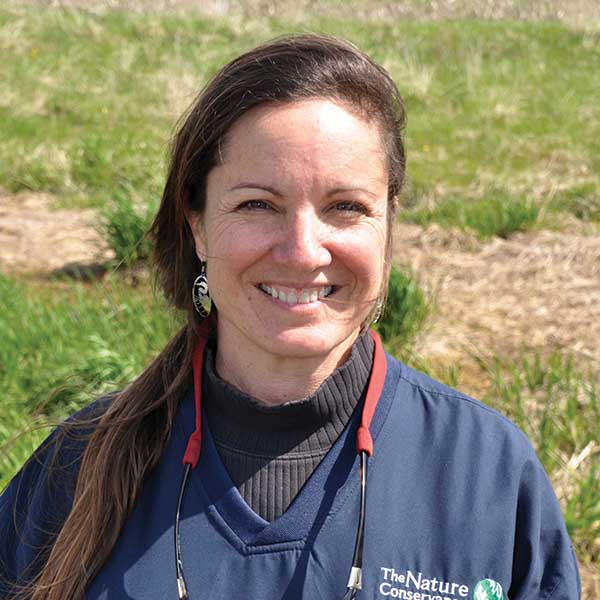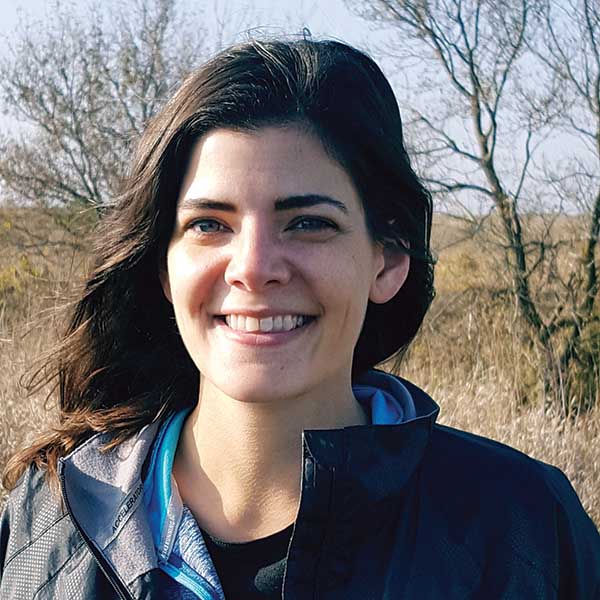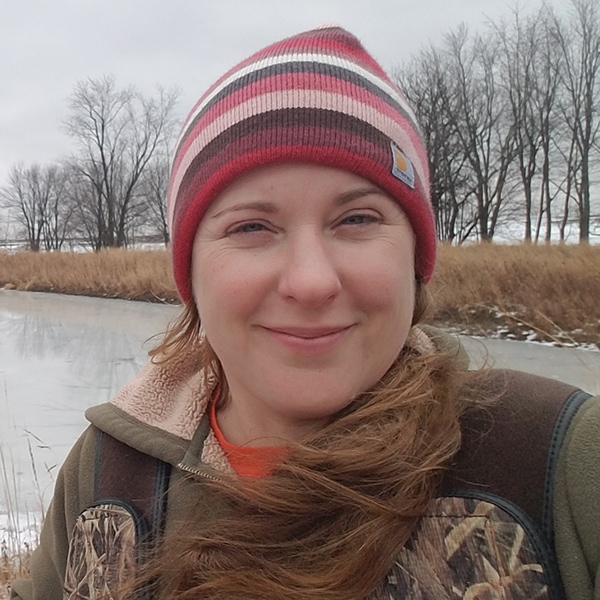Marjory Stoneman Douglas, Rachel Carson, Jane Goodall and Greta Thunberg… You may recognize these names as female giants of conservation and advocacy for our natural world. The month of March was a celebration of women and their global contributions in a rainbow of disciplines, businesses, social justice issues and environmentalism. As we look ahead to Earth Month in April, The Nature Conservancy (TNC) features several women in Illinois who have been leading the charge to create pathways to a more resilient state—especially in the agriculture space.
 Dr. Maria Lemke is the chapter’s first female director of conservation science, a role she’s held for the past year and a half after serving as aquatic ecologist for 15 years. She leads research on wetlands at the Franklin Farm in nearby Lexington, Illinois.
Dr. Maria Lemke is the chapter’s first female director of conservation science, a role she’s held for the past year and a half after serving as aquatic ecologist for 15 years. She leads research on wetlands at the Franklin Farm in nearby Lexington, Illinois.
Why is it important to you to encourage young women and girls in this space?
Lemke: It is important for everyone to increase awareness of nature and to do what they can to conserve earth’s resources and diversity. For women and young girls in particular, I think everyone should have the opportunity to follow their passion. How would a young girl know that science and working in nature is her passion if she is never exposed to it?
Can you recall a moment in your past when it was clear that conservation was your calling?
Lemke: Long ago in graduate school, I applied for a post-doctoral position. In my cover letter, I wrote that the two things I wanted to use my education as a scientist for were to reduce agricultural impacts on freshwater streams and rivers and to restore wetlands. I found that letter a few years ago when I was cleaning out some files. What I would say, then, is that my greatest achievement with TNC is that I have had the opportunity to do just that.
What has been one of the most rewarding experiences as part of your role at TNC?
Lemke: I really enjoy the opportunities to branch out in ways that create new opportunities and partnerships that can help scale up our work in Illinois—and to learn more about what TNC is doing across the state of Illinois and beyond.
 Megan Baskerville of Decatur was recently promoted to agriculture programming lead, guiding key partnerships to provide support to farmers and others seeking to make their sites more resilient.
Megan Baskerville of Decatur was recently promoted to agriculture programming lead, guiding key partnerships to provide support to farmers and others seeking to make their sites more resilient.
What part of your work have you found most fulfilling?
Baskerville: I’m really proud of the work we’ve done with partners across the state to build up the Illinois Sustainable Ag Partnership. It’s a great resource for farmers and advisors across Illinois to utilize as they consider soil health and conservation drainage practices.
Why is it important that women are leaders in the conservation movement?
Baskerville: Conservation solutions, or science, will only be robust and resilient if we have diverse perspectives and voices shaping the solutions. We need to make sure women are well-represented at the table.
 Krista Kirkham, a 13-year Conservancy aquatic ecologist, is primary technician for TNC’s Mackinaw Program research sites, including its paired watershed project, Franklin Research and Demonstration Farm, and Bloomington Drinking Watersheds Project.
Krista Kirkham, a 13-year Conservancy aquatic ecologist, is primary technician for TNC’s Mackinaw Program research sites, including its paired watershed project, Franklin Research and Demonstration Farm, and Bloomington Drinking Watersheds Project.
Thinking back to your youth, what stands out in your memories that was influential in leading you to working in the environmental world?
Kirkham: I have to thank my parents for instilling the importance of our environment and conserving our natural areas. I grew up in rural south-central Illinois, and almost every summer, my family would pack up the station wagon and we’d take a trip to the southern or western U.S., and visit state and national parks along the way. At home, we spent many hours outside: tending to the garden, riding bikes, or tending to our various pets and 4-H projects. I didn’t know what my major would be in college as a freshman, but after my first introductory biology class, I was hooked.
Why do you think it’s important that young girls foster relationships with nature and think about careers in this space?
Kirkham: Young women interested in science need to be encouraged and supported. It’s incredibly important for young women and girls to have role models in STEM (Science, Technology, Engineering, Mathematics) careers. I remember first hearing about Jane Goodall and her work with primates when I was a child, and she seemed like a superhero to me. The world is facing serious and immediate environmental issues, and it’s our responsibility as adults to ensure that young women—especially young women of color—know their value and importance as future decision-makers in this space. There is room at the table for everyone to make the world a better place! PM
For more information about The Nature Conservancy, visit nature.org/Illinois.




